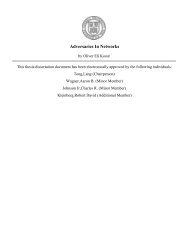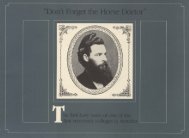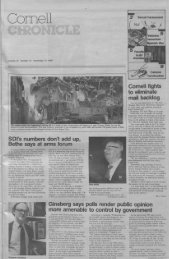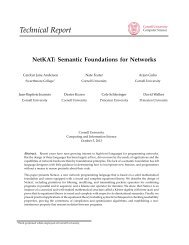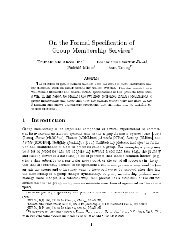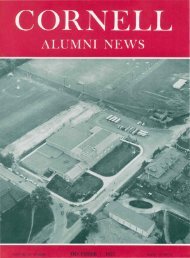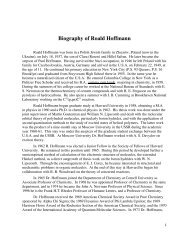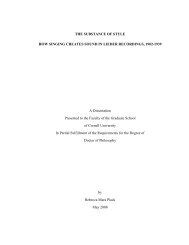Cornell Alumni News - eCommons@Cornell - Cornell University
Cornell Alumni News - eCommons@Cornell - Cornell University
Cornell Alumni News - eCommons@Cornell - Cornell University
You also want an ePaper? Increase the reach of your titles
YUMPU automatically turns print PDFs into web optimized ePapers that Google loves.
works by others. One is the tremendous development<br />
planned within the drama department which, if it comes to<br />
pass, I think it will, will mean that <strong>Cornell</strong> will not only<br />
be a much more interesting place from the standpoint of<br />
theater, but that involvement in the theater will be a much<br />
more attractive idea to the students.<br />
Another area connected to the theater is the Ithaca Festival.<br />
In the university's dealing with the Festival, a local<br />
civic group which plans to bring a first-rate repertory company<br />
to Ithaca on a permanent basis, we have been con-<br />
'The branch libraries . . .<br />
are being used as<br />
study space, not<br />
because they are needed<br />
as libraries, but<br />
because they're quiet.'<br />
stantly alert to the possibility of programs in the late spring<br />
and early fall which would arouse student interest.<br />
We have also started thinking very seriously about the<br />
new calendar which will go into effect the next academic<br />
year. It will have an intersession period. We hope to use<br />
that time, about two weeks, for developing cultural programs<br />
not feasible during the school year. For example, one<br />
program might be an organized two-week visit by history<br />
of art students to New York City museums. Another is the<br />
possibility of permitting upperclass students in psychology,<br />
sociology, and the social sciences generally, to use New<br />
York City during that time as a laboratory. This would be<br />
a short-term version of the very successful New York City<br />
program now being employed by the College of Architecture.<br />
Another change in the local cultural environment for<br />
students involves the revision in program format of radio<br />
station WHCU, which is owned and operated by the university.<br />
The evening programs on WHCU-FM especially<br />
have been made more attractive to the university community,<br />
students as well as faculty.<br />
Q. A perennial student complaint criticizes the university<br />
library system, particularly library hours. Have any changes<br />
been made in the library system?<br />
A. Yes. Students last year were most urgently demanding<br />
later library hours and also demanding unlimited undergraduate<br />
stack access to the Olin Research Library. This was<br />
looked into by a special committee of the Library Board,<br />
established in part under auspices of the commission. The<br />
committee, a student-faculty committee, was headed by<br />
Francis E. Mineka, the Class of 1916 Professor of English.<br />
The committee found that the demand for later library hours<br />
prior to and during the examination periods was certainly a<br />
valid criticism. As a result, we will probably keep the Uris<br />
undergraduate library open later at the end of each semester.<br />
The committee has also experimented with the popularity<br />
of later hours at other seasons in the course of the school<br />
year. The results are being tabulated at the moment.<br />
Another problem identified was the need toward the end<br />
of the term for study space, not necessarily library space,<br />
but quiet study space, away from people. The branch libraries<br />
throughout the campus are being used as study space,<br />
not because they are needed as libraries, but because they're<br />
quiet. If it is the fifth day of examinations and your roommate<br />
has had all of his exams and is interested in doing<br />
nothing but waiting for a ride home, you head for peace<br />
and quiet. The undergraduate college deans are providing<br />
study space and the Willard Straight staff provides study<br />
space in various Straight rooms at the end of the term.<br />
As far as stack permits to Olin Library are concerned,<br />
the committee looked into this and decided that the real<br />
problem was not stack access but study space, as I have<br />
already mentioned. The committee felt that unlimited undergraduate<br />
access to the Olin stacks would dreadfully interfere<br />
with graduate student use of those stack spaces. The committee,<br />
therefore, reiterated the belief that the concept of a<br />
separate undergraduate library and graduate research library<br />
was a good concept and should be maintained.<br />
Q. Did the Commission attempt to lessen the difficulty<br />
of intercollege transfer?<br />
A. The major recent progress on that front was generated<br />
by the deans of the College of Engineering and the<br />
College of Arts and Sciences without any real help from<br />
the university commission. This was accomplished largely<br />
through a change in procedure under which a student now<br />
admitted in the College of Engineering's quota stays under<br />
that quota even if he transfers to Arts. This seemingly simple<br />
procedural change appears to have gotten to the heart of the<br />
problem regarding transfers between Engineering and Arts,<br />
the primary area of difficulty experienced in the past.<br />
Q. Is the Commission going to expire at a certain time or<br />
does it plan to keep going?<br />
A. Well, the original plan was that the commission would<br />
stop its work this spring. I don't know now whether that will<br />
occur. I do know my own feelings on the subject. There<br />
seems to be a continuing need for a person or a small group<br />
of people to have constantly at the top of their priority list<br />
the improvement of undergraduate education. Most of the<br />
improvement will occur outside this group, from ideas developed<br />
at the grass roots, just as it has during the existence<br />
of the commission. This group doesn't need to be as large<br />
and time-consuming an operation as the commission. Furthermore,<br />
an organization like the commission, which works<br />
through a backlog of ideas and problems generated by other<br />
committees, probably ought to stop before it just gradually<br />
runs downhill. These, of course, are my own convictions,<br />
but I suspect there is a lot of agreement on the part of other<br />
members of the commission on these points. However, we'll<br />
have to wait until later in the spring to determine what<br />
course of action will be followed.<br />
Q. One last question: Is there any university office with a<br />
clear cut responsibility for the continuing improvement of<br />
undergraduate education?<br />
A. Well, nobody has ever said this in print, but I'm<br />
perfectly prepared to say it here. That's one of the responsibilities<br />
of my office.<br />
May 1967 25




